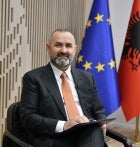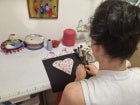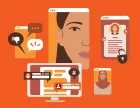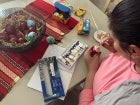Breadcrumb
Stories
Topic
- Show all (1276)
- Ending violence against women and girls (-) (72)
- Laws, legislation (-) (26)
- Financial and economic crisis (-) (1)
- Gender equality and women’s empowerment (45)
- Anti-violence interventions (41)
- Gender discrimination (38)
- Gender equality and inequality (38)
- Domestic violence/interpersonal violence (36)
- Access to justice and legal protection (33)
- Legal assistance (29)
- Gender-responsive budgeting (24)
- Primary prevention (24)
- Sexual harassment (24)
- Feminicide/femicide (23)
- Service delivery (23)
- Economic empowerment (22)
- Rape/sexual assault (21)
- Employment (20)
- Shelters (20)
- Rural women (19)
- Entrepreneurship (18)
- Decision-making (16)
- Youth (16)
- Gender power relations (15)
- Women’s rights (15)
- COVID-19 (14)
- Financing for gender equality (13)
- Gender mainstreaming (13)
- Civil society (12)
- Gender, culture and society (12)
- Men and boys (masculinity) (12)
- Political empowerment (12)
- Access to basic services (11)
- Adolescents (11)
- Businesses and foundations (11)
- Girls (11)
- Human rights (11)
- UNiTE campaign (11)
- Beijing Platform for Action (10)
- Civil society participation (10)
- Peace and security (10)
- Safe Cities and Safe Public Spaces (10)
- Training (10)
- Women with disabilities (10)
- Convention on the Elimination of All Forms of Discrimination against Women (CEDAW) (9)
- Financial resources (9)
- Information and communications technology (ICT) (9)
- Leadership and political participation (9)
- National planning (9)
- Partnerships (9)
- Gender stereotypes (8)
- Governance (8)
- Innovation and technology (8)
- Institutional mechanisms (8)
- Peacebuilding (8)
- Social protection (8)
- Women farmers (8)
- Citizen engagement (7)
- Gender statistics (7)
- Generation Equality (7)
- Government contributors (7)
- Productive resources (7)
- Religion (7)
- Science and technology for development (7)
- Sports (7)
- Trafficking/sexual exploitation (7)
- Women’s movements (7)
- 2030 Agenda for Sustainable Development (6)
- Child marriage (6)
- Communications and media (6)
- Electoral systems and processes (6)
- Lesbian, gay, bisexual, transgender, intersex (LGBT) rights (6)
- Markets (6)
- Political violence (6)
- Sex-disaggregated data (6)
- Sustainable Development Goals (SDGs) (6)
- Unpaid work (6)
- Accountability (5)
- Gender data production and collection (5)
- Governance and national planning (5)
- Rural development (5)
- Traditional media (5)
- Constitutions and legal reform (4)
- Gender data gaps (4)
- Gender data use and accessibility (4)
- Gender wage gap (4)
- Health (4)
- Intergovernmental processes (4)
- Land and property (4)
- New media (4)
- Poverty (4)
- Public administration (4)
- Rule of law (4)
- Schooling (4)
- Accountability in the UN system (3)
- Climate change (3)
- Crisis response and recovery (3)
- Education (3)
- Environmental protection (3)
- Gender equality indicators (3)
- Health care services (3)
- Inheritance rights (3)
- Living conditions (3)
- Media leadership (3)
- National mechanisms (3)
- National statistical systems (3)
- Parliamentary development (3)
- UN Security Council resolution 1325 (3)
- UN system coordination (3)
- Capacity development (2)
- Coordination, knowledge management (2)
- Disaster risk reduction (2)
- Food security (2)
- Fundamental freedoms (2)
- Fund for Gender Equality (2)
- Harmful practices (2)
- Humanitarian action (2)
- Human rights–based approach (2)
- Macroeconomic policies (2)
- Monitoring and evaluation (2)
- Planning and monitoring (2)
- Sexual and reproductive health and rights (2)
- UN Security Council resolutions (2)
- Urban development (2)
- Åsa Regnér, Deputy Executive Director for Policy, Programme, Civil Society and Intergovernmental Support (1)
- Children’s rights (1)
- Commission on the Status of Women (1)
- Executive Director (1)
- Green economy (1)
- Literacy (1)
- Local development (1)
- Maternal health (1)
- Migration (1)
- Monitoring, evaluation and reporting (1)
- Peace processes (1)
- Public sector reform (1)
- Sexuality (1)
- Temporary special measures, affirmative action (1)
- UN Trust Fund to End Violence against Women (1)
1 - 20 of 85 Results
Pagination
Date:
UN Women Albania, in partnership with the Government, civil society, international partners, and UN agencies, marked this year’s 16 Days of Activism Against GBV under the theme #NoExcuse – UNiTE to End Violence Against Women and Girls. Activities included awareness campaigns, exhibitions, an award ceremony, youth initiatives, and private sector collaborations.
Date:
In this interview, Ulsi Manja, Minister of Justice of Albania, highlights the government's commitment to advancing gender equality through the justice system. He discusses the importance of gender-responsive budgeting, ongoing efforts to address the needs of women and girls, and key interventions such as free legal aid, humane conditions in penal institutions, and measures to combat gender-based violence.
Date:
People's Advocate along with the support of UN Women released a report on the killings of women and girls, as well as femicide, revealing that 32 women were killed between 2021-2023.
Date:
Women and girls with disabilities in Albania are not only faced with physical and structural barriers but also with the often less visible yet pervasive threat of gender-based violence. On the International Day of Persons with Disabilities, they shared their stories of resilience, despite numerous challenges.
Date:
The UN’s November 2024 Flagship Report on Disability and Development calls for accessible services, better data collection, and inclusive policies.
Date:
Monika Kocaqi has dedicated twenty-five years to preventing gender-based violence (GBV) in Albania and her work is far from over. She has led groundbreaking initiatives, including the early implementation of the Domestic Violence Protection Law, overcoming skepticism and driving systemic change. Monika Kocaqi supported the establishment for the first time of the Coordinated Referral Mechanisms and enhanced the legal knowledge of professionals. She has been at the forefront of initiatives like gender-responsive budgeting to secure vital services for survivors of gender-based violence. Her extensive work includes authoring over forty training manuals, strategies, and research studies on GBV and gender mainstreaming in Albania and beyond.
Date:
The media forum provided a dynamic space for knowledge exchange, interactive sessions, and collaboration with gender and human rights experts. Journalists were equipped with new tools to report on sensitive issues with accuracy and inclusivity, challenge harmful stereotypes, and adopt innovative approaches.
Date:
From 23 to 25 September, UN Women Europe and Central Asia Regional Director, Belen Sanz Luque, and the Deputy Regional Director, Elisa Fernandez Saenz conducted their first visit to Tirana to participate in the Beijing+30 International Conference and meet government representatives and funding partners in the country.
Date:
The revision of Albania’s 2008 Gender Equality Law is underway, as a concrete action following recommendations received by the UN Committee on the rights of women (UN CEDAW).
Date:
UN agencies, national and international partners, visit North Albania to assess progress of the UN Joint Programme on Ending Violence Against Women.
Date:
The week leading to International Women’s Day buzzed with various activities, ranging from a youth-led campaign addressing gender discrimination in the workplace to the launch of Albania's Femicide Watch. An interesting panel featuring only men offered intimate insights into their experiences with patriarchy, feminism, and women’s rights. These events, held in collaboration with governmental bodies, UN agencies, private sectors, and academia, underscored a collective effort to tackle gender inequality from various angles.
Date:
Over the past decades, women and girls around the world have demolished barriers, dismantled stereotypes and driven progress towards more just and equal societies. Women’s rights were recognised as fundamental and universal human rights.
Date:
On International Women’s Day, the People’s Advocate in cooperation with UN Women launched the ‘Femicide Watch’. This first of its kind initiative will collect and analyze data at the national level to promote more effective policies and mechanisms to prevent gender-based killings of women.
Date:
On the occasion of International Women’s Day, UN Women and students of the Faculty of Social Sciences in Albania launched a campaign to tackle gender stereotypes and discrimination, in partnership with Sophie Caffe, a popular coffee shop chain in the country. The initiative won first prize in a student “bootcamp” organized by UN Women as part of the joint UN programme "Leave No One Behind”.
Date:
How a women’s rights organization and the National Employment and Skills Agency in Albania are joining forces to support women survivors of violence integrate in the job market.
Date:
Forty one percent of Albanian women active online have experienced some form of technology-facilitated violence in their lifetime – the new research “The Dark Side of Digitalization: Technology-Facilitated Violence Against Women in Eastern Europe and Central Asia” shows.
Date:
They are asking for increased long-term, sustainable investments from government, private sector, foundations, and other donors to prevent violence against women and girls.
Date:
In a dedicated effort to promote gender equality and eliminate all forms of discrimination against women, Albania is preparing for its fifth report to the Committee on the Elimination of All Forms of Discrimination Against Women (CEDAW), scheduled for October 18, 2023.
Date:
After six years of dedicated work, the UN Women regional programme Ending Violence Against Women and Girls in the Western Balkans and Turkyie “Implementing Norms, Changing Minds” comes to a close. Civil society organizations, government representatives and partners met to take stock of achievements, challenges, and the way forward.
Date:
Supported by a small grant from the UN Trust Fund, the Center "Shelter Edlira Haxhiymeri", in close partnership with the Streha Center for LBT women survivors of domestic violence, runs a project to end violence against women and girls in four remote areas of Albania.
1 - 20 of 85 Results



















